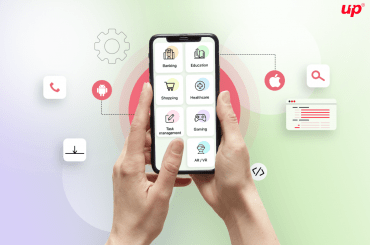The cloud computing technology is reaching new heights with each passing year. Developments in this industry are moving at a notable pace that can be infuriating to follow and impracticable to envisage.
 Information Technology has a crucial role in today’s business environment. With the advancement of IT, the concept and trends of cloud computing are also vitally changing the way that businesses operate. Tens of thousands of companies of all sizes in a broader range of industries are employing cloud-based software, cross-platform, and even state-of-the-art infrastructure to restructure processes, lower IT intricacy, expand better visibility, and reduce costs.
Information Technology has a crucial role in today’s business environment. With the advancement of IT, the concept and trends of cloud computing are also vitally changing the way that businesses operate. Tens of thousands of companies of all sizes in a broader range of industries are employing cloud-based software, cross-platform, and even state-of-the-art infrastructure to restructure processes, lower IT intricacy, expand better visibility, and reduce costs.

Even with such advancements in cloud computing, the stroke between a cloud app and a web app remains contradictory as ever. It, of course, generates from the expected similarities that subsist between them. In this guide, we will look into the basics of cloud app and webs apps and the prominent differences between these computing technologies. With the intent to understand the different web applications, it is essential to have a complete understanding of these individual apps.
What is a Cloud App?

A cloud app is an application that functions via the cloud and has some distinctiveness of both simple desktop apps and simple web apps. A cloud app is said to be working as an advanced web app. Such apps are used to check online content over the Internet as web apps, but these apps are not inclined on a web browser to work. Some primary functioning of a cloud app is:
- Information is stored in cloud communication, which is a form of the information environment
- Data and information can be cached locally
- Contains different user requirements
- Can be operated from desktop or mobile devices
- Accessible to a superior range of services
- Can be used Internet-connected devices like desktops, mobile phones
- Can be used to operate a broader range of services like on-demand computing cycle, storage, app development platforms.
Some of the popular cloud apps that users get in touch with our Evernote, Mozy, Dropbox, SalesForce, and Sugar Sync.
What are web apps?
Web apps are almost entirely designed to be used wholly from a web browser. A mixture of server-side script (ASP, PHP, etc.) and client-side script (HTML, JavaScript, Adobe Flash) are usually accessed to create the web application. The web browser depends on the webserver gears installed on backend environment systems for the heavy lifting in offering its core functional web services. The prominent examples of web apps are WebEx, online web applications like eBay and others. These are some of the most commonly used apps by users. The web apps are famous for the provision of consumer customization services. The noticeable benefit of web apps is that this computing software offers over accessibility from anywhere through the web browser. Cloud apps can also be accessed this way. Some of the benefits of web apps are:
- Access flexibility
- Safe and secure client login
- Hassle-free setup
- Storage Enhancement
- User friendly across multiple platforms

The most significant difference between web and cloud app is accessibility. Web apps are almost entirely accessed via web browsers. If a web app wants to develop as a cloud app, it must become reachable from anywhere even without the availability of a web interface.
Any web app development company is quick to utilize advantages brought about by the revolutionary web-app building framework advancements for superior customer reach. However, these technologies are not inevitably optimized for developing new apps for the cloud era.
Also Read: Five ways how Artificial Intelligence is transforming enterprise mobility
Cloud apps are relatable to web apps in the sense that they can be used via web browsers, but not all web apps are relatable cloud apps. Most developers often bundle web apps to further sell as “cloud” apps as they are the most ‘in’ technology in the present date. Still, web apps do not provide the same luxury in functionality, and customization one can get from cloud apps. So a proficient web app development should know how to make the best choice among these apps.
Cloud-based apps are the Future of IT
The advent and popularity of the webs application are on a notable rise. But due to the modern advancements taking place in cloud-based apps, the future of IT companies surely lies in these apps. The present scenario of the IT world depicts that web apps are dominating the cloud-computing technology, but more businesses have already started moving towards adapting the cloud-based app technology. The cloud-based apps are beneficial in website optimization. Website optimization works by enhancing and increasing the brand awareness and increasing user engagement. By improving user engagement, the businesses will be able to enjoy the smooth flow of revenue.

Conclusion:
With the emergence of cloud-based apps, entrepreneurs are taking full advantage of the technology as it is helping in business expansion. One should still consider all the benefits and drawbacks of these computing technologies before introducing them to their businesses. 










